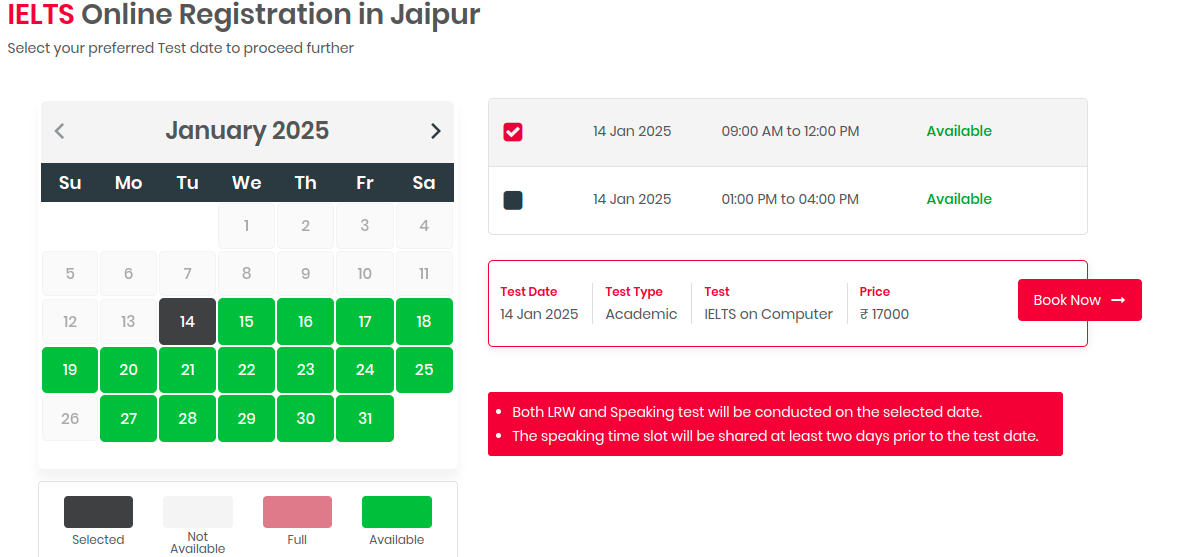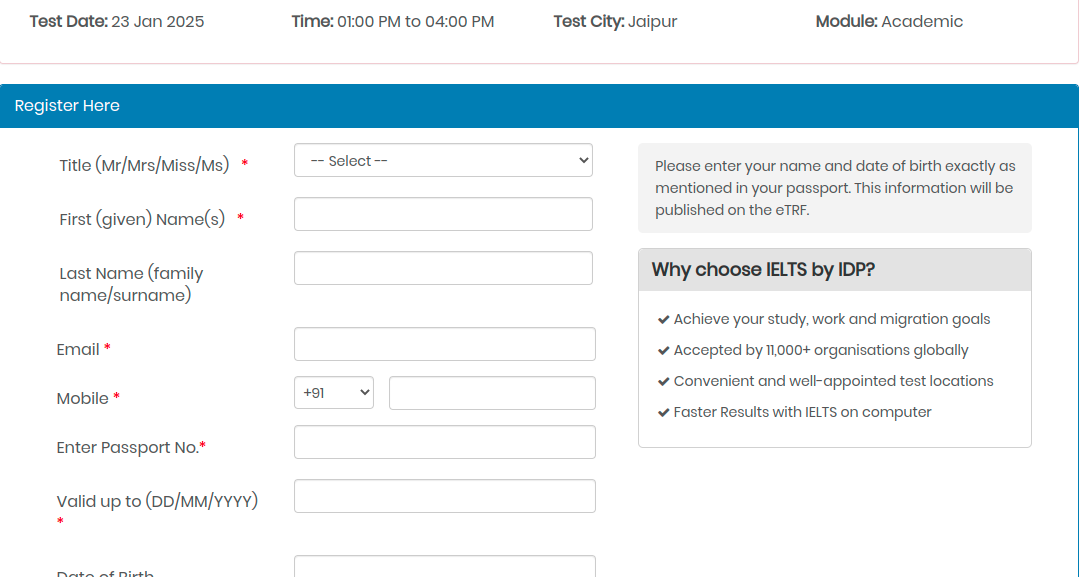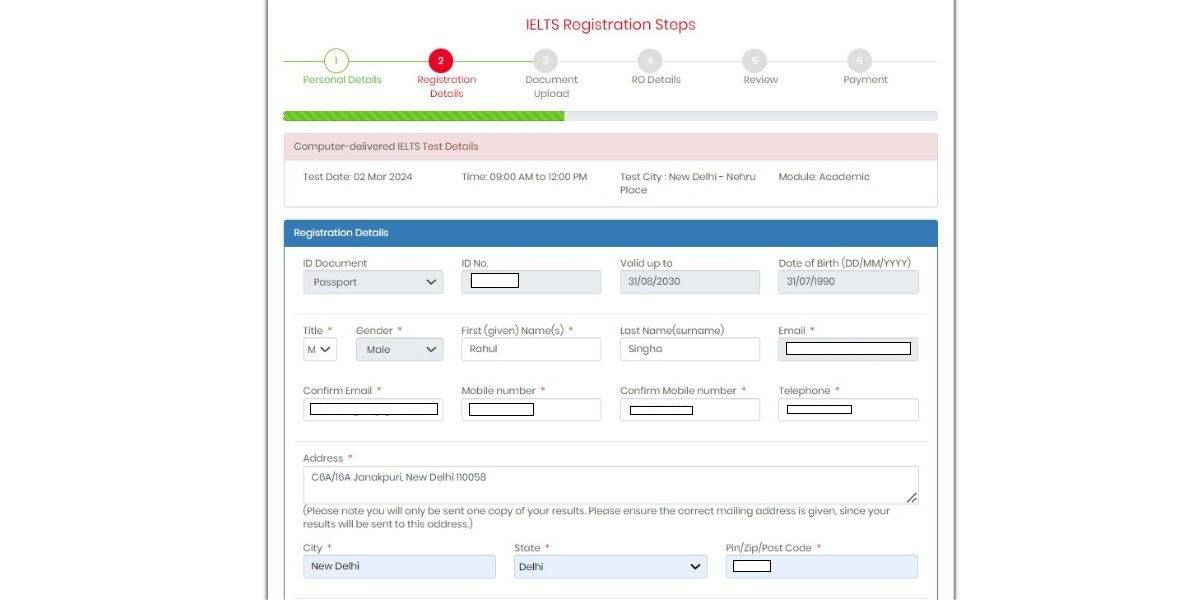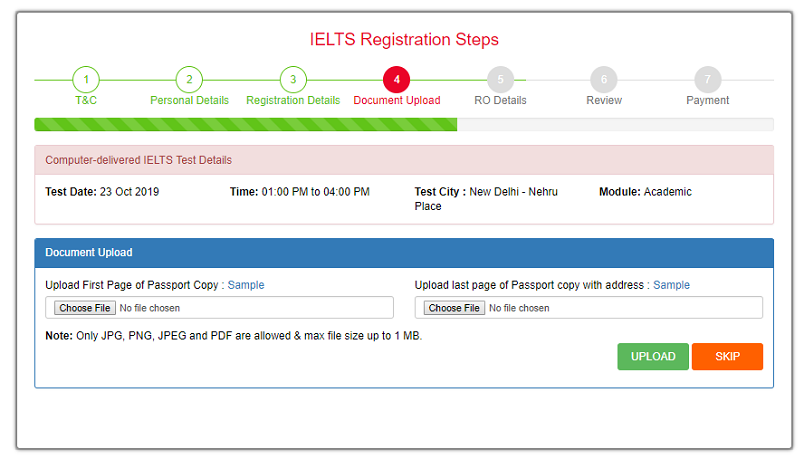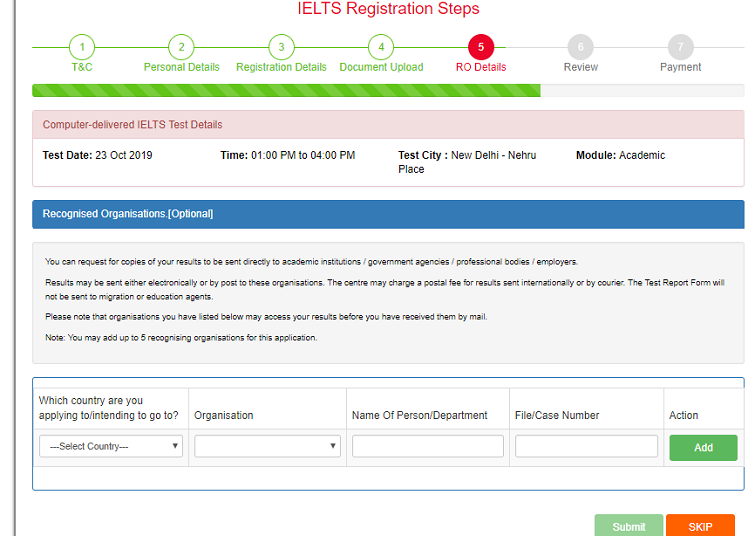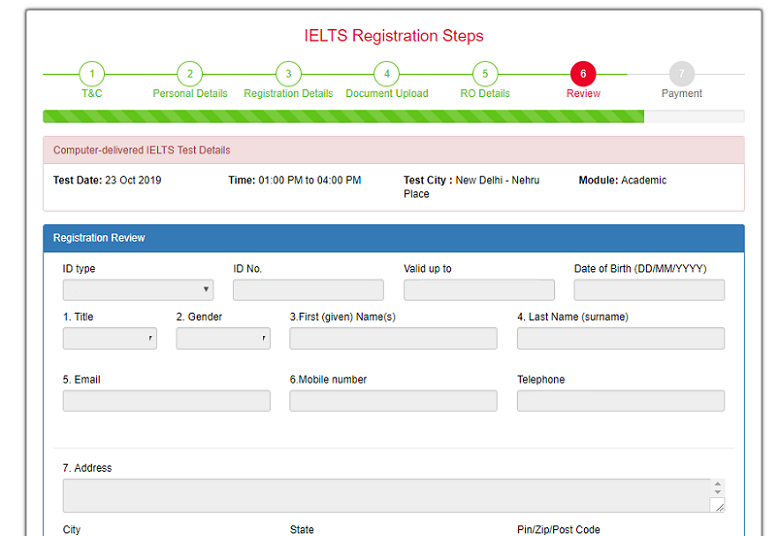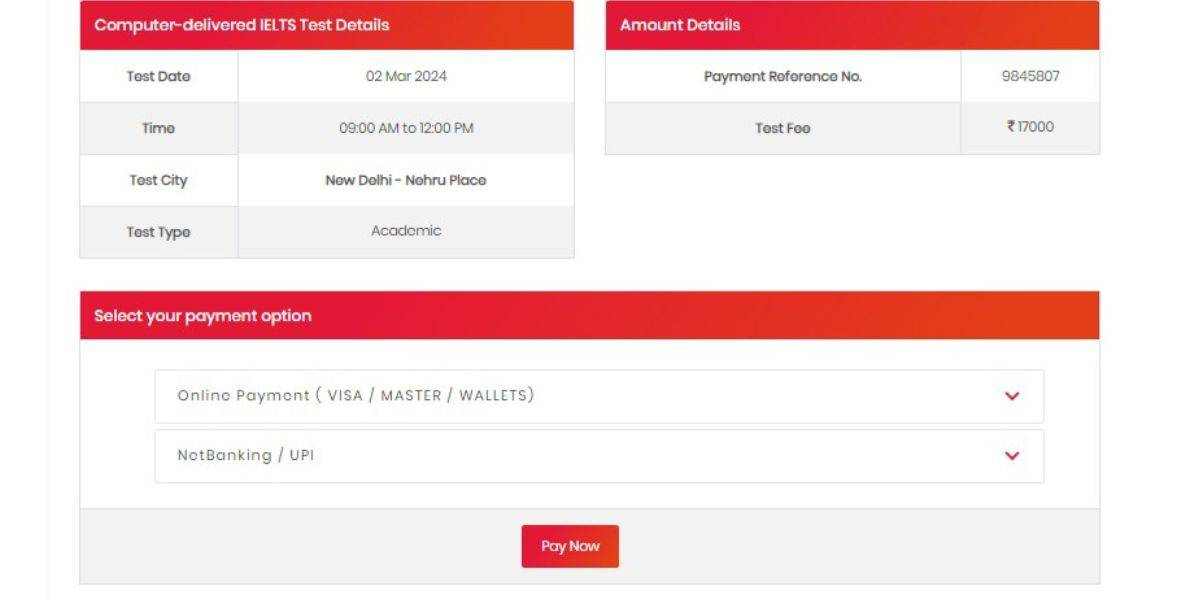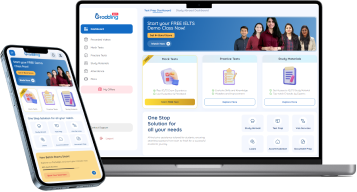Are you planning to take the IELTS exam in 2025 whether to study abroad or to seek employment in an English-speaking country? Well, the IELTS exam is conducted all around the year, and one can register for it on their selected day, depending on the availability and time slot. However, many of the students are not aware of how they can book their IELTS exam. Thus, in this blog, we will talk about how to apply for IELTS exam online or offline both with other necessary information. So, let’s get started with it.

Table of Contents
This section will let you know about the IELTS registration process in detail. However, IELTS aspirants must know that they can appear for the exam in two ways. One is the IELTS Paper-delivered test and the second is the IELTS Computer-delivered test. Below are the IELTS registration details for both types of formats.
These are the IELTS registration details for both types of formats. The next part will let you know about the registration process for IELTS through online and offline methods.
IELTS online registration is a simple and popular option for test-takers, as it is easily accessible in remote areas. The online process generally takes up to 15 to 20 minutes to complete. However, check out the below-given steps and learn how to apply for IELTS exam through the online method.
Image Source from this step to the last step: IDP IELTS Registration
Step 1: Candidates are required to log into their official IDP registration page.
Step 2: Select the option ‘Register for IELTS’ to create an IDP IELTS login account, and then select the preferred test type i.e. computer-delivered or paper-based. After that, they need to select the module i.e. Academic or General along with the test city.
Step 3: On completion of the above steps, candidates will find a series of dates available for their preferences. Select your desired date and time slot.
Step 4(a): Candidates are then required to fill up their personal details and complete their online application form. Also, you need to upload a clearly scanned colour copy of your passport to complete the process.
Step 4(b): Enter your registration details
Step 4(c): Upload the copies of your passport
Step 5: Now Select the colleges/universities you wish to send your IELTS score to (Optional)
Step 6: Review all your details carefully before making the final payment.
Step 7: Make the payment through a debit/credit card.
Step 8: Once the IELTS exam fee payment is made candidates can take a printout of their acknowledgement receipt.
Overall, this is the process for online IELTS registration for both paper-based and computer-based delivered tests. The next part will let you know the process for registering for the IELTS exam by offline method.
IELTS offline registration is straightforward. You can register for the exam at any IDP branch or head office by using any of the three methods. However, before understanding how to apply for IELTS exam through offline mode you need to keep a few things in mind that are as follows:
Now given below are the three modes for offline IELTS registration that students can follow.
Here are the IELTS registration details of this method.
One such method of offline IELTS registration is mentioned below.
One such method on how to apply for IELTS exam is in the offline category.
Overall, this is the process that students can follow for offline IELTS registration. The next section will let you know about the IELTS slot booking 2025.
Booking a slot for the IELTS exam is an essential step in the registration process, where you can confirm your preferred exam slot. This would make sure that you have a reserved place for the test on the selected date. However, it is always advisable that you book your slot for the IELTS exam at least 3-4 weeks before the test date, as spots may fill up fast. Furthermore, in this section, you will get to know the step-by-step process of IELTS slot booking for 2025.
Overall, this is the procedure for IELTS slot booking in 2025. Now our next section will cover some important documents that you will need for the IELTS exam.
While registering for the IELTS exam, you need some essential documents with you and need to carry them on the test day. Thus, given below are the documents required for IELTS exam registration for your preference.
Overall, these are the documents required for IELTS exam registration that students need to carry with them. In the next section, you will find out about the registration fees for the IELTS exam.
The IELTS exam fees 2025 are the same for both Academic and General training versions. However, there is a slight difference in the fees for IELTS UKVI booking. Further, the IELTS registration fee in India is INR 17,000 for both paper-delivered test and computer-delivered test.
The table below provides detailed information on IELTS test fees according to the types of IELTS exams.
| IELTS Test Type | IELTS Test Fee 2025 |
|---|---|
| IELTS on Computer for UKVI | INR 17,250 |
| IELTS on Computer | INR 17,000 |
| IELTS Life Skills (A1 and B1) | INR 16,050 |
| IELTS for UK Visas and Immigration | INR 17,250 |
| IELTS on Paper | INR 17,000 |
| One Skill Retake | INR 11,300 |
Overall, this was all about the IELTS exam fees 2025 category-wise. The next section will talk about the cancellation or rescheduling of the IELTS test.
Through the above sections, you must have understood how to apply for IELTS exam online or offline. However, in this section, we will let you know about the cancellation and rescheduling of the IELTS exam.
Candidates who wish to change their test date or want to reschedule their IELTS exam need to raise a request at least five weeks before their booked test date. Also, the new test date that you will get will be within three months of the original test date. Moreover, candidates also need to pay an administrative charge of INR 4,250 inclusive of all the taxes for the transfer of the test date.
The IELTS cancellation policy states that if you cancel your IELTS test five weeks before the test date, you will receive a refund minus a 25% administrative fee. However, if you cancel the IELTS exam less than five weeks ahead of the test date, you will get no refund. Further, the total IELTS cancellation fee of 2,325 will be deducted from the examination fee paid by the applicant. The next section will talk about the eligibility criteria for the IELTS exam.
Note: In case if you fail to appear for the test, then you will get no refund. This will also count in the cancellation.
The IELTS exam is open to all and there are no specific eligibility criteria. The universities can have different eligibility criteria but IELTS has no particular selection criteria. Thus, check out the below-given points to learn about IELTS exam eligibility criteria for students.
Overall, this is about the IELTS exam eligibility 2025 for students. Our last section will cover the IELTS test centres for students.
The IELTS exam is conducted and offered on demand all over the country. However, in the table below we have listed the IELTS test centres in India for the year 2025.
| Ahmedabad | Amritsar | Bengaluru |
| Bhatinda | Bhopal | Bhubaneswar |
| Calicut | Chandigarh | Chennai |
| Coimbatore | Delhi | Hyderabad |
| Jaipur | Jalandhar | Kochi |
| Kolkata | Kottayam | Lucknow |
| Ludhiana | Madurai | Mumbai |
| Navi Mumbai | Patiala | Pune |
| Raipur | Rajkot | Surat |
| Thiruvananthapuram | Thrissur | Trichy |
| Vijayawada | Vadodara | Vapi |
These are some of the major IELTS test centres in India where students can appear for the IELTS exam.
To sum up, we discussed how to apply for IELTS exam, online and offline, and the necessary registration details. Further, we also had a brief look at the IELTS slot booking, documents, fees, eligibility, and test centres. Before appearing for the IELTS, you need to understand the procedure to go for it. Thus, if you are facing issues in knowing the IELTS exam and what it is then you are at the right place! Join our offline or online IELTS coaching at affordable prices.
Candidates can register for the IELTS exam offline or online. Through these two methods, students can book their IELTS exam by paying the fees of INR 18,000.
If you have taken the IELTS exam on paper, your IELTS results will be available 13 days after your test date and in 1-2 days if you have taken the IELTS exam on a computer.
The IELTS score validity is for two years from the test of the date. After the two years, the scores may not be considered as official for some purposes.
There is no specific limit on the number of attempts for the IELTS exam.

We are available in :
BangaloreAhmedabadJaipurHyderabadKeralaPuneChandigarhMumbaiGurgaonChennaiKolkataTrivandrumNoidaKochiCalicutKottayamKollamThrissurIndoreUdaipurdisclaimer:logos and other registered trademarks of universities used on this platform are held by their respective owners. Gradding does not claim ownership or association on them, and their use is purely for informational and illustrative purposes.


